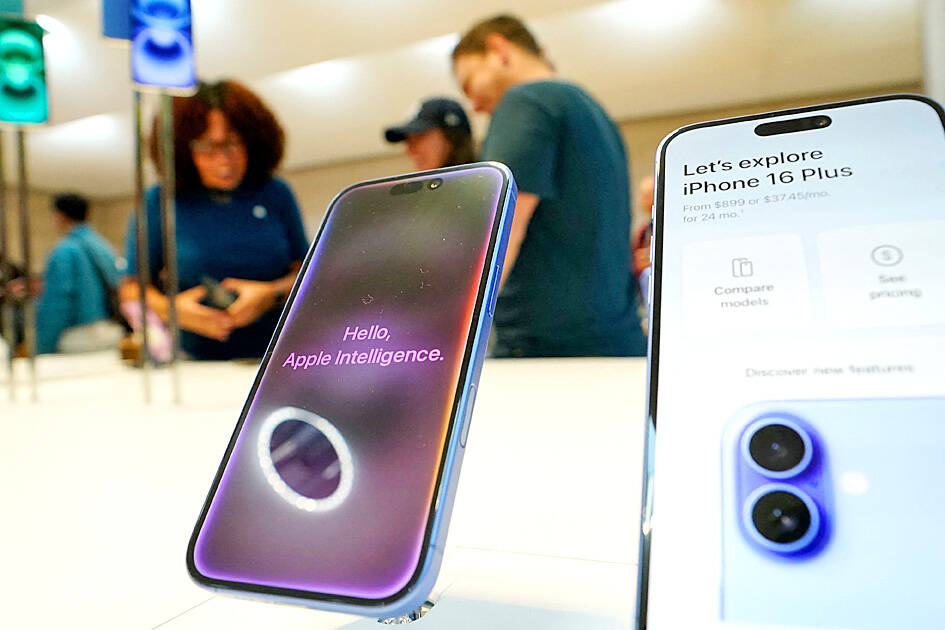Apple Inc lost its status as the best-selling smartphone brand in the crucial Chinese market last year, new data showed on Thursday, with a pair of local rivals surpassing it with surging shipments.
The California-based tech giant claimed a market share of 15 percent in the world’s number two economy, behind Huawei Technologies Co’s (華為) 16 percent and top-ranking Vivo Communication Technology Co’s (維沃) 17 percent, according to industry data provider Canalys.
Also coming in at 15 percent, with total smartphone sales narrowly behind Apple’s, were Chinese brands Oppo Mobile Telecommunications Corp (歐珀) and Honor Device Co (榮耀), the data showed.

Photo: AFP
Apple’s performance in the country is suffering from a slump in iPhone sales, which dropped to 42.9 million last year, compared with a market-leading 51.8 million the previous year.
“Intense competition has led to a constantly shifting landscape,” Canalys research manager Amber Liu (劉藝璇) said, adding that Apple “faced growing competitive pressure from domestic flagship devices.”
Top-ranked Vivo showed “strong momentum” last year, Liu said, adding that the firm’s strategy was helping “solidify its position in entry-level to mid-to-high-end segments.”
Meanwhile, Huawei, a Shenzhen-based tech giant that was once the target of tough sanctions from Washington due to national security concerns, continued a resurgence in its home market last year.
The firm achieved a 37 percent year-on-year jump in total smartphone shipments last year, the Canalys data showed.
Apple’s iPhone remains popular in China, but many consumers in the vast market have switched to domestic alternatives in recent years as sector competition intensifies.
Apple CEO Tim Cook visited China multiple times last year, as the US tech giant sought to shore up slumping sales in the country.
Apple’s fourth-quarter smartphone shipments plunged 25 percent from a year ago, Canalys data showed.
The Chinese smartphone market as a whole expanded five percent year-on-year in the fourth quarter, the report added, with total shipments reaching 77.4 million units.
Beijing last week announced that it would roll out subsidies for individual purchases of certain smartphones, part of a discount scheme it hopes would boost spending as the economy wavers.
The latest policy “has laid the foundation for this year’s market growth,” Canalys research analyst Lucas Zhong (鐘曉磊) said, adding that “vendors have already begun preparations for channels and supply.”

In Italy’s storied gold-making hubs, jewelers are reworking their designs to trim gold content as they race to blunt the effect of record prices and appeal to shoppers watching their budgets. Gold prices hit a record high on Thursday, surging near US$5,600 an ounce, more than double a year ago as geopolitical concerns and jitters over trade pushed investors toward the safe-haven asset. The rally is putting undue pressure on small artisans as they face mounting demands from customers, including international brands, to produce cheaper items, from signature pieces to wedding rings, according to interviews with four independent jewelers in Italy’s main

Japanese Prime Minister Sanae Takaichi has talked up the benefits of a weaker yen in a campaign speech, adopting a tone at odds with her finance ministry, which has refused to rule out any options to counter excessive foreign exchange volatility. Takaichi later softened her stance, saying she did not have a preference for the yen’s direction. “People say the weak yen is bad right now, but for export industries, it’s a major opportunity,” Takaichi said on Saturday at a rally for Liberal Democratic Party candidate Daishiro Yamagiwa in Kanagawa Prefecture ahead of a snap election on Sunday. “Whether it’s selling food or

CONCERNS: Tech companies investing in AI businesses that purchase their products have raised questions among investors that they are artificially propping up demand Nvidia Corp chief executive officer Jensen Huang (黃仁勳) on Saturday said that the company would be participating in OpenAI’s latest funding round, describing it as potentially “the largest investment we’ve ever made.” “We will invest a great deal of money,” Huang told reporters while visiting Taipei. “I believe in OpenAI. The work that they do is incredible. They’re one of the most consequential companies of our time.” Huang did not say exactly how much Nvidia might contribute, but described the investment as “huge.” “Let Sam announce how much he’s going to raise — it’s for him to decide,” Huang said, referring to OpenAI

The global server market is expected to grow 12.8 percent annually this year, with artificial intelligence (AI) servers projected to account for 16.5 percent, driven by continued investment in AI infrastructure by major cloud service providers (CSPs), market researcher TrendForce Corp (集邦科技) said yesterday. Global AI server shipments this year are expected to increase 28 percent year-on-year to more than 2.7 million units, driven by sustained demand from CSPs and government sovereign cloud projects, TrendForce analyst Frank Kung (龔明德) told the Taipei Times. Demand for GPU-based AI servers, including Nvidia Corp’s GB and Vera Rubin rack systems, is expected to remain high,